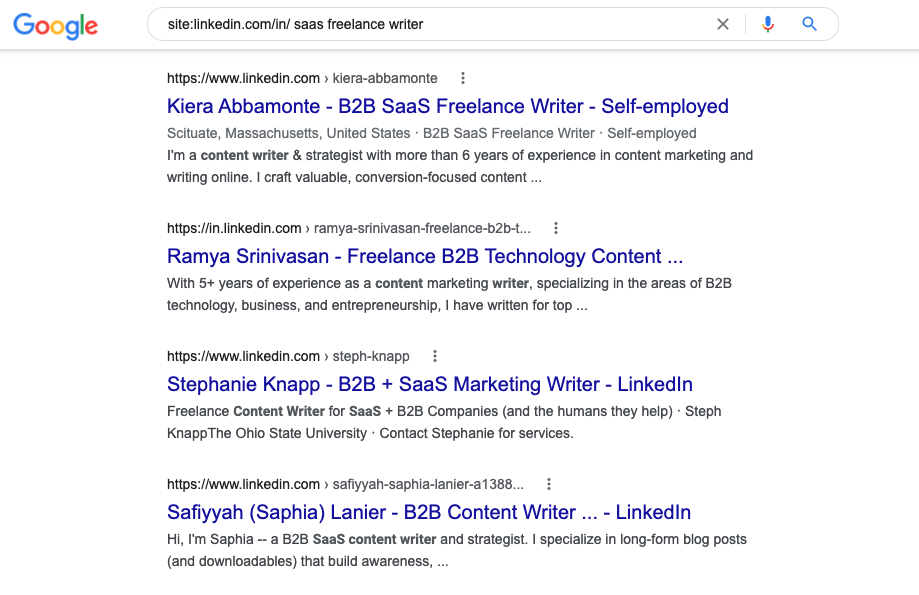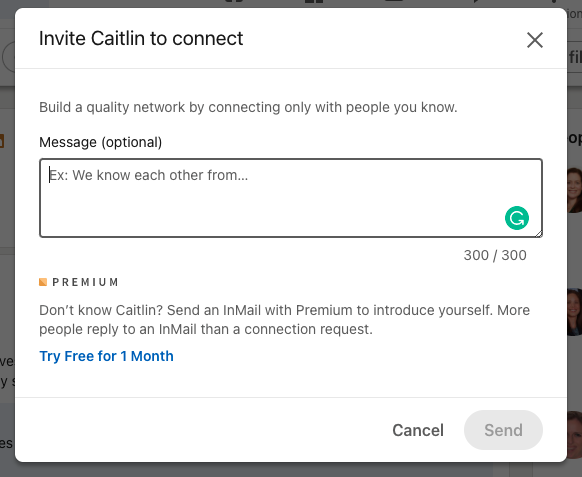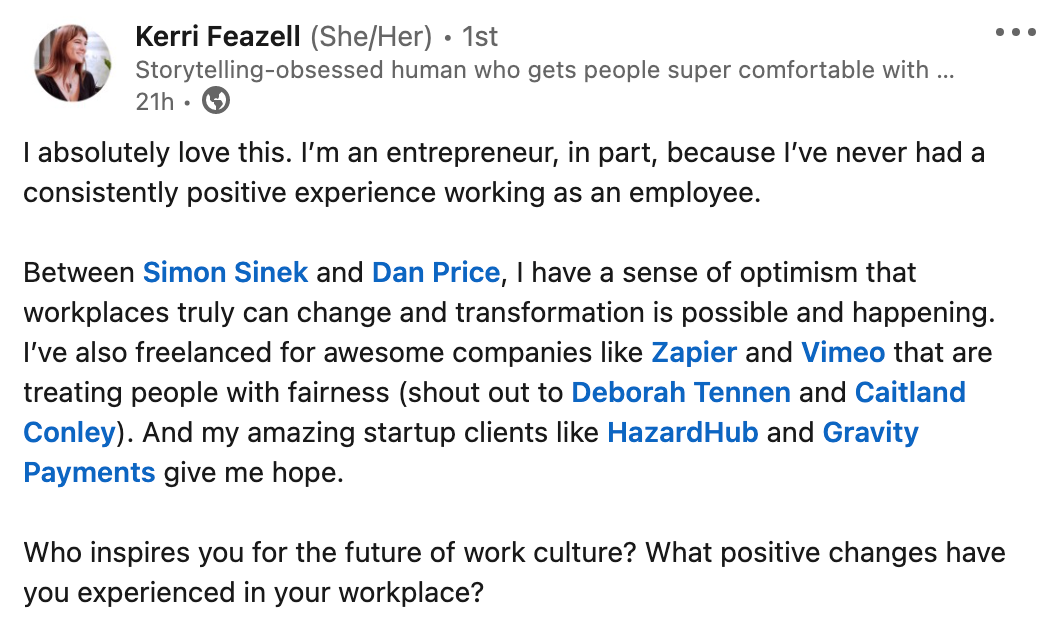If I had a nickel for every time someone told me to "just hire more freelancers" ...oh sorry, I started Googling how much it costs to clone a dog.
Here's the thing: you can't just hire more freelance writers and call it a day. Someone needs to manage those people. Find them, test them out, onboard them, communicate with them, work with them on the content, edit their writing, get their work on site, pay them...you get the gist. It's a real job—one Zapier hired me to do—and shouldn't be relegated to a bullet point within another job description.
If you're reading this, I'm probably preaching to the choir, so let's get to the good stuff. I've been working with freelance writers for over a decade, and while I'm still improving my workflow, there are a few things that I'd recommend to anyone starting out with freelancers—or anyone thinking about overhauling their process.
1. Source smartly
I've definitely gotten some incredible inbound applications from freelance writers—folks reaching out directly or responding to a job posting. But in my experience, the best freelancers are recruited: not necessarily because they're better writers, but because you know they're right for your business.
There are a bunch of ways to recruit freelance writers. My absolute favorite is asking other freelancer managers for recommendations—people are generally willing to share their favorites. But if you're just starting out and don't have those kinds of connections, you can get great results from LinkedIn. When I first started working at Zapier, it's where I found almost all of my freelance writers.
LinkedIn search leaves something to be desired, so I do my searches through Google. Type site:linkedin.com/in/ followed by a keyword into Google, and you'll get a bunch of results. What that keyword is will depend on your industry, but always try a few variations, including the words writer, freelance, freelancer, freelance writer, and so on.

If someone looks like a good fit, you have two options:
1. Find their website. Most writers have a website that hosts their portfolio and includes a way to contact them. It might be linked within their LinkedIn profile, or you can do a Google search on their name and title and see if you can find it that way.
2. Send them a message on LinkedIn. If you can't find a contact form or email address, shoot them a message on LinkedIn. You don't need Premium InMail to do this—just click Connect > Add a note, and then write a quick message.

Here's what I usually say in that note.
Hi XXXX,
I'm the managing editor of the Zapier blog. We're in search of freelancers, and it looks like you might be a good fit for us! If you're interested in learning more, please send me an email ([my email address]), and I can send you more information.
Thanks!
P.S. If you decide to go the inbound route, get your job posting on the right sites. Don't post on Indeed or other general job sites; instead, find boards that are niche to your industry.
2. Request a writing exercise first
Almost every piece of content marketing has been edited.
That's great news for consumers who don't have to read sloppy or confusing content, but it's less great when you're hiring freelancers. Why? Because writing samples can be very misleading. When people link to articles they've written previously, there's no way for you to know how much of the work is theirs and how much is the publication editor's.
It's very possible the writer submitted site-ready work, and you're reading their writing word-for-word, but it's also possible what you're reading doesn't even vaguely resemble their actual writing.
The best way around this is to require freelancers to do a writing test for you before bringing them on board. It shouldn't be a slog for them (limit it to about an hour of work, max), but it should help you understand if this person is a good fit. Can they lean in to your brand's style? Do they have the subject matter expertise necessary? Are they able to work within the constraints of your program? (And, of course, can they write well?)
Some folks might be hesitant, but if you're transparent about your reasoning, you should get a solid response rate. Here's what I tell freelancers when I let them know about the writing exercise:
The goal is to be sure your writing style—especially when writing about apps and productivity—is a match for Zapier.
We understand that it's not necessarily typical to require writing exercises from freelancers. If you don't feel comfortable doing so, we completely understand, but unfortunately, we won't be able to move forward without one. Thanks for your understanding!
Note: If you've recruited someone and are confident in their abilities (maybe you've consulted with another publication they worked for, or they have enough LinkedIn recommendations to feel trustworthy), you can skip this step.
3. Agree on rates early—and have a standard rate
Before you start working with freelancers, know what you plan to pay them. I'm not going to suggest rates because it varies wildly from industry to industry, but you can ask other folks in your industry what they pay. Or you can reach out to some of the writers you've sourced to see what their rates are, and then determine yours based on that.
Make sure you have a set rate for each type of project you assign. For example, we pay freelancers more to write our best apps roundups because they require super in-depth research and app testing, compared to a productivity article that's more about someone's personal experience and shouldn't take quite as long to complete.
Another tip: don't pay by the word. Because time is money for freelancers, it makes sense that they might not spend the extra time to make their work as concise as possible. If you pay by the word, you'll almost always end up overpaying, even though the extra words are actually making the content worse. Instead, determine an hourly rate you think is fair—and within your budget—and then estimate how long it will take to write the content. (Even better, write an article yourself to see how long it takes.) Multiply, and that's your price.
While it's ok to diverge from your standard rates a bit for someone who submits site-ready work, avoid paying wildly different rates for each of your freelancers. That's a recipe for unconscious bias and uneven quality.
4. Prioritize content knowledge over writing chops
If you don't have an editor on staff, hire one. I might be a tiny bit biased, but having an excellent editor is absolutely necessary for a successful freelancing program. There are a ton of reasons for this, but the main one is that it allows you to get freelancers for their subject matter expertise more than their writing.
Yes, your freelancers need to be able to write well—but it's more important that they're trustworthy when it comes to the content area. An editor can make the writing shine however necessary, but it's not scalable to have an editor flexing across different topics in depth.
Using our best apps roundups as an example: if someone were to submit to me an app roundup with excellent information, apps thoroughly tested, detailed analysis, and a clear understanding of the app category—even if it were a total mess, I could rewrite it in a matter of a couple hours. But if someone wrote clean, engaging, and generally perfect copy with light content, a lack of testing, and a clear misunderstanding of the app category, I'd have to spend dozens of hours testing apps and checking their work.
Of course, this applies only to long-form content—for copywriting and other short-form types of content, you'll need to focus on writing chops.
5. Have templates for onboarding
Giving your freelancers all the information they need upfront will save you approximately a bajillion hours down the road. Obviously your processes will be unique to your content, but here are a few things you should send them right off the bat. (The rest can come on a per-project basis.)
The process. Tell them how they should expect to work with you (email? project management app? Slack?) and what each step of the process (outline, revisions, stuff like that) looks like.
Examples of content. Give them a few examples of excellent content on your site that you want them to emulate. That gives them something to look back at whenever they need some inspiration.
Your brand voice guide. If you don't have one, give them a quick note about what you're looking for. (Also, you should have one!)
The contract. Make sure they sign a contributor agreement—you should work with a legal team or consultant on this one. You want to be sure you own the content they're submitting (that's standard).
Invoicing. Tell them upfront how they'll invoice and when they'll be paid.
Any info you need from them. Do you need an author bio? Their social handles? Anything else? It might take a bit for them to get it to you, so you want to ask for these things right away.
Kill fee. Do you have a standard kill fee (an amount you pay if you kill the project part-way through or decide not to publish it)?
If you provide this all at the beginning, whenever a writer has questions, you can ask them to refer to this one info dump. I have a few different versions of it, depending on the content type, and each one is saved as a template in Gmail (and included in our internal documentation in case I get hit by a bus). You might even have a Google Doc that you link folks out to.
6. Be nice, be prompt, be human
I really wish I didn't have to include this tip, but I do. Be nice. Be prompt. Respond to emails.
Like with everything in life, you get back what you put in. If you don't respond to emails promptly, that gives writers an excuse to miss deadlines. If you don't answer their questions thoroughly, you won't get the quality of work that you need. And if you're curt or condescending, the best writers will (rightfully) walk away.

It's not uncommon for me to get an email from a writer thanking me for being thorough, prompt, or nice. And it kills me—why would anyone be anything but?
7. Automate
If you're going to scale your freelance program, you'll benefit from automating some of your processes. A few workflows you might set up:
Whenever an article by a certain author is published on your site, automatically send an email to the author letting them know.
Whenever an invoice is submitted, automatically add it to your budget tracking spreadsheet.
Whenever you get confirmation of an assigned project in Gmail, automatically add it to your editorial calendar or tracking app.
Add new QuickBooks Online invoices to Google Sheets spreadsheet rows
My colleague Janine, who also manages contributed content here at Zapier, has a Zap that sends approved pitches from a spreadsheet (which come in through a form) straight to our editorial calendar in Airtable.
Create Airtable records from new or updated Google Sheets spreadsheet rows
Zapier is a no-code automation tool that lets you connect your apps into automated workflows, so that every person and every business can move forward at growth speed. Learn more about how it works.
The more you can do to streamline your processes, the more you can focus on building relationships with your freelancers and editing their work to create stellar content.
So yes, hire more freelancers. But remember that's just the beginning.





